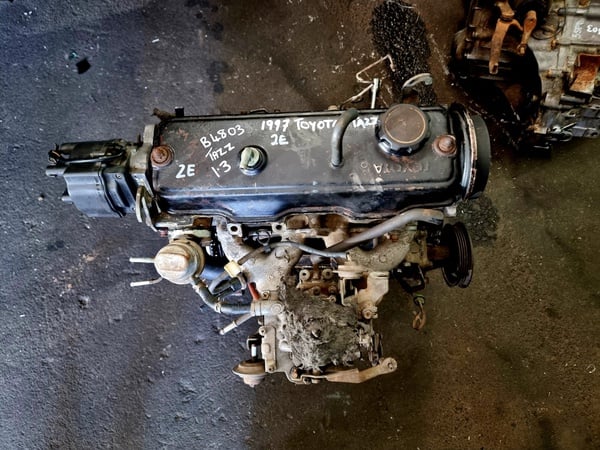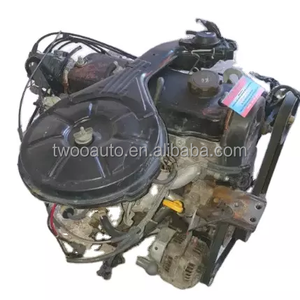Toyota Tazz: A Comprehensive Review of Performance and Comfort
Toyota Tazz: A Comprehensive Review of Performance and Comfort
Blog Article
Check Out the current Trends in Engine Innovation With Tazz
In the swiftly evolving landscape of auto technology, Tazz stands at the center, highlighting substantial advancements in engine systems that prioritize both advancement and sustainability. tazz. From crossbreed engines that optimize fuel effectiveness to the development of hydrogen gas cells, the fads forming contemporary powertrains are not only improving efficiency yet additionally addressing important environmental challenges. As the sector remains to push borders, it is important to think about exactly how these advancements will affect future transportation remedies and the more comprehensive ramifications for worldwide energy consumption. What exists ahead in this critical change?
Crossbreed Engine Innovations
Crossbreed engine technologies represent an essential shift in auto innovation, combining the benefits of interior burning engines with electric propulsion systems. This combination not just enhances gas performance however additionally lowers discharges, meeting increasingly rigorous environmental guidelines. By using both power sources, hybrid engines can maximize efficiency, supplying power when required while conserving fuel during less demanding driving problems.
Recent advancements in hybrid modern technology consist of renovations in battery efficiency and regenerative braking systems. These advancements permit better power recuperation during slowdown, which can be redirected to aid in acceleration or power accessory systems. Producers are concentrating on lightweight materials and compact styles to make the most of the effectiveness of crossbreed powertrains.
The advancement of plug-in crossbreeds has also increased the marketplace, enabling motorists to charge their vehicles utilizing basic electric outlets. This attribute commonly enables substantial all-electric range, more reducing reliance on typical fuels. tazz. As the auto sector proceeds to develop, hybrid engine innovations are anticipated to play a critical duty in bridging the void between traditional vehicles and completely electrical designs, giving a transitional service that provides to diverse customer requirements and preferences
Advancements in Electric Powertrains
The auto landscape is rapidly advancing, with electric powertrains emerging as a leading force in sustainable transport. Advances in electrical car (EV) modern technology are substantially boosting user, performance, and performance experience. Secret innovations include enhancements in battery chemistry, which have boosted power thickness, lowered billing times, and extended total battery life.
Solid-state batteries, as an example, promise to revolutionize the marketplace by giving greater security and efficiency contrasted to conventional lithium-ion cells. Improvements in regenerative stopping systems are allowing lorries to recover energy during slowdown, contributing to overall efficiency.
In addition to battery modern technology, electric motor layouts are ending up being more advanced. Technologies such as incorporated electric motors and advanced thermal administration systems are aiding to maximize power shipment and lower weight, inevitably boosting lorry dynamics.

Jointly, these developments underscore the commitment to change towards cleaner, more reliable transport options, positioning electric powertrains at the leading edge of vehicle innovation.
The Increase of Hydrogen Fuel Cells
Increasingly, hydrogen gas cells are obtaining grip as a practical alternative to conventional interior combustion engines and battery electric cars. This modern technology utilizes the chemical energy stored in hydrogen, transforming it into electrical energy via an electrochemical response with oxygen. The main by-product of this process is water, making hydrogen fuel cells an eco-friendly choice with no emissions at the tailpipe.

Car manufacturers are significantly buying hydrogen fuel cell technology, acknowledging its capacity for long-range applications and fast refueling abilities that equal traditional fuels. In addition, markets such as durable transport and public transportation are particularly fit for hydrogen fuel cells, where battery electrical options might drop short as a result of weight and array limitations.
As research and investment continue to increase, hydrogen gas cells are poised to play a significant role in the future landscape of tidy transport and power services.
Enhancements in Internal Burning Engines
Advancements in internal burning engine (ICE) modern technology are changing typical lorries to meet modern environmental criteria and efficiency assumptions. Straight gas injection, for circumstances, allows for much better atomization of fuel, leading to even more full browse around this site burning and improved power output.
In addition, turbocharging has gained prestige, enabling smaller sized engines to deliver greater efficiency without the weight of bigger engines - tazz. This innovation not only enhances performance yet also adds to decrease gas intake. Variable valve timing systems are additionally being improved, making it possible for engines to adapt to numerous driving problems for improved torque and responsiveness
Furthermore, using lightweight materials in engine building and construction is ending up being standard, more enhancing gas effectiveness by reducing general car weight. Engine control systems (ECUs) are increasingly sophisticated, enabling real-time changes that maximize efficiency and exhausts.
These enhancements collectively symbolize moved here an essential shift in ICE technology, straightening with global sustainability objectives while still giving the performance vehicle drivers anticipate from their lorries. As the sector develops, these improvements remain to shape the future of conventional auto design.
Future Patterns in Engine Effectiveness
Considerable innovations in engine effectiveness are anticipated as makers concentrate on integrating sophisticated innovations to satisfy rigorous ecological regulations and consumer needs. The shift in the direction of electrification, crossbreed systems, and alternative gas is improving the automotive landscape, driving technologies that enhance fuel economic situation and decrease emissions.
One of the key trends is the execution of sophisticated products and manufacturing methods. Light-weight compounds and high-strength alloys add to decreased car weight, thus enhancing overall efficiency. Furthermore, the fostering of turbocharging and variable shutoff timing technologies allows for enhanced power result from smaller sized engines, further boosting fuel economic climate.

Verdict
Developments in hybrid engine systems, electrical powertrains, and hydrogen gas cells demonstrate a dedication to reducing discharges while boosting performance. Renovations in inner burning engines and a focus on lightweight materials contribute to total engine performance.
From crossbreed engines that enhance fuel effectiveness to the introduction of hydrogen fuel cells, the fads forming contemporary powertrains are not only boosting efficiency however likewise dealing with vital environmental challenges.Crossbreed engine advancements represent a crucial shift in automotive modern technology, incorporating the benefits of inner combustion engines with electrical propulsion systems.Furthermore, turbocharging has actually acquired prestige, enabling smaller sized engines to deliver greater efficiency without the weight of larger engines. Furthermore, the fostering of turbocharging and variable valve timing modern technologies enables for boosted power output from smaller sized engines, better enhancing gas economy.
Improvements in interior burning engines and an emphasis on light-weight materials add to overall engine efficiency.
Report this page